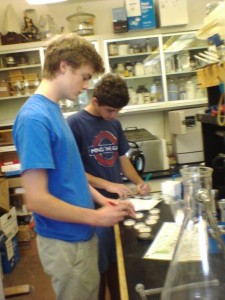PESTICIDE-FREE NEW CANAAN
|
Home Are Pesticides Safe? Why Go Pesticide-Free? How to Maintain Pesticide-Free Lawns and Gardens Resources: Articles, Land Care Professionals, Links Hall of Fame Pesticide Notification Registry High school students present pesticide findings to selectmen From: the New Canaan Advertiser This past summer, New Canaan High School juniors Michael Schulte and Eli Litchman spent six weeks working on a Pesticide Educational Research Fellowship (PERF), raising awareness about the health and environmental dangers of chemical lawn pesticides and conducting research on their prevalence in New Canaan. After conducting analysis, the two presented their findings to the Board of Selectmen on Tuesday, Oct. 22. |
 |
Schulte and Litchman went door-to-door taking surveys of residents’ lawn care practices, and also collected surface water samples that they analyzed for nitrates, phosphates, and Escheria coli (all indicators of pesticide contamination) with Harbor Watch of Westport.
Surface water is water that is running, as in a stream or river, as opposed to pond water that is stagnant, or ground water that has soaked down into soil.
Complex analysis for the detection of specific pesticides was conducted directly by CT DEEP, in response to a call from PERF designer and coordinator Heather Lauver, who expressed concern about the high volume of chemical trucks seen servicing New Canaan residences.
Twenty-four different chemical pesticides were detected throughout New Canaan’s surface water, usually in combinations of two or three on average. Kiwanis Park was clear of detectable pesticides.
Of greatest concern was the area on the corner of Indian Rock and Country Club Roads. Eighteen different lawn chemicals were detected at this site, which borders a golf course.
“All pesticides have negative health impacts,” Schulte explained to selectmen. “All harm you in some way.”
Dinoseb, a chemical banned by the EPA in 1986 for its links to birth defects and sterility, was detected in a sample taken at Mead Park, according to the findings. Pesticide-Free New Canaan’s co-founder Micaela Porta said the town will ask CT DEEP to re-test this site from various entry and exit points.
Both sets of findings allow for more accurate monitoring of conditions in specific locations, particularly around homes located near the Five Mile River. Schulte and Litchman’s results comprise the initial data for what will become an annual history of pesticide prevalence and contamination in town.
“Many of the most commonly-used chemical lawn pesticides are known carcinogens and neurotoxins,” Porta said in a press release. “Persistent exposure to low quantities of these substances has been linked to numerous diseases and chronic conditions, most alarmingly in children. There is currently a ban in Connecticut on chemical lawn pesticides at all K-8 schools and younger. New Canaan voluntarily opts out of treating high school grounds and fields to protect children of all ages from exposure. The Department of Public Health (DPH) recommends that residents test water quality of private wells annually.”
Selectman Beth Jones lauded the students for their hard work.
“I hope you continue on with this because we need more young minds working on this — and more open minds too,” Jones said. “It’s great work and it gives us a great basis, and I hope we can follow up with the state.”
Jones called the work a great public education effort and said people should know that what they are putting on their lawns to remove a few dandelions is going down the Five-Mile River and into Long Island Sound.
PERF was funded by the St. Mark’s Episcopal Church Outreach Fund, the New Canaan Community Foundation, and Patagonia of Westport. PERF is a project of Pesticide-Free New Canaan, a nonprofit initiative devoted to the reduction of chemical lawn pesticide use in our town, and is open to all New Canaan students. Students from New Canaan High School interested in applying for PERF’s 2014 Summer session can contact Christian Dockum, chairman of the science department; all others should contact Heather Lauver directly by emailing Pesticide-Free New Canaan at zzpesticidefreenewcanaan@yahoo.com.